Immigration lawyers need greater protection from the government and support from international colleagues, according to a report from a US-based human rights body examining events surrounding last month’s riots.
In a report published yesterday, Human Rights First said attacks on those providing legal advice to migrants are not confined to the UK.
Immigration lawyers in the US and elsewhere should ‘engage with their British counterparts to learn how they might support them, to understand the latest lessons in the methods of the far right, and for advice on how best to counter targeting and attacks’, the report suggests.
Read more
Zoe Bantleman, legal director at the Immigration Law Practitioners Association, told Human Rights First that the recent threats against immigration lawyers ‘were the natural inheritance of a climate of hostility fuelled by divisive, anti-migrant and populist rhetoric’ and that ‘the inflammatory language has come both from senior politicians in previous governments and from certain parts of the media, upon which the far-right have latched’.
While the immediate risk has dissipated and the swift sentencing that followed the riots are welcome, Bantleman said the government must change the negative narrative around migration, publicly acknowledge that people have the right to seek asylum in the UK, and prioritise the wellbeing of both migrants and those who represent them.
The report urges the UK government to increase engagement with immigration lawyers and respond to their concerns and fully comply with UN principles on the role of lawyers. The US legal community should publicly condemn attacks on their UK colleagues and encourage US-based social media companies ‘to desist from promoting inflammatory messaging’ against UK immigration lawyers and immigrants.
The report’s author, Brian Dooley, told the Gazette that UK immigration lawyers he interviewed for the report spoke of feeling isolated and vulnerable last month.
Noting that US immigration lawyers have previously been vilified, he fears they could be targeted more intensely if Donald Trump is elected president. Should that happen, 'I hope lawyers in Britain recognise that and ask lawyers in the US if there is anything they can do in terms of international solidarity', Dooley said.
This article is now closed for comment.




























6 Readers' comments